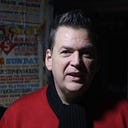Member-only story
Steven Keats
A character actor throughout the 70s and 80s who held his own alongside everyone from Robert Mitchum to Frank Sinatra.

“Nobody told Kirk Douglas to fill in the dimple on his chin, so why should they tell me to fill in the gap between my two front teeth? I can put caps on them, the same as I can put a hump on my back. That’s what an actor does; he changes physically and psychologically from role to role”.
1970s American films threw up a number of reliable character actors whose faces seem familiar even if you can’t always recall their names. Steven Keats may well fall into that bracket. A regular guest star on many drama series he was also a standout in a few notable films of the era.
Born in the South Bronx in 1945 his father was a Danish immigrant born to Polish Jewish parents from Warsaw. His mother was born in New York, also to a Polish Jewish family. Keats grew up in Canarsie, Brooklyn. “I was the black sheep”, he told the New York Times. “The bad guy, the one who belonged to street gangs, the classic ghetto kid.”
At 18 he enlisted in the Air Force. His parents cut all ties with him. He was assigned to the Forward Air Controllers in Vietnam. It was to have an intense effect on him for the rest of his life. Their mission was to fly in search of the enemy, direct air strikes over them, and then to fly low and count the dead. Author Don Bell wrote an oral history of Forward Air Controllers in 2015. “FACs flew at an elevation from one foot to 500 feet…at 600 miles per hour, in hot, dehydrating cockpits fit for battle but not for human occupants.”
Keats served across 1965 and 1966. “It’s a miracle that I came back with my mind as well as my body, intact,” he said. With one broken marriage already on his return to the States, he spent some time in therapy, where he felt he began to understand how his father’s troubled childhood had shaped the person he became as an adult.
Deciding to pursue acting Keats began attending Montclair State College. Here he was spotted by scouts from Yale School of Drama.
His off-Broadway debut came in 1970 in One Flew Over the Cuckoo’s Nest. The following year he made his Broadway debut in the second cast of Oh! Calcutta. Here he met his second…
